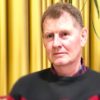Gravediggers had dug two rectangular holes. Whitish pebbles lay in the orange-brown soil beside the graves. The roundness and wholeness of the pebbles conveyed the purity of perfect consciousness, like Fabergé eggs.
An Imam in white–a robust wall of a man with an ebony beard–was waiting with the gravediggers to give a final tribute to the dead. The lit-up dust floating over the graves resembled an illuminated spirit waiting to carry the deceased to another plane. The stretchers were laid down beside pebbles with the aura of precious stones inlaid into clay. Clamorous silence fell, as if the sky’s quietude had descended to bless the earth, the father’s lips descending to kiss his sons’ foreheads for the final time.
As the father rose a friend placed his arms around him. Saad embraced them both, a human statue of three devoted to bereavement that stood, unmoving, while the Imam, opening his palms, said: “Everything that God creates, he takes back.”
His voice bellowed out like a cannon of belief. David’s chest tightened as if a vibrating reed swaying within was being checked by a jittery vice of struggling stoicism. He sucked in, his eyes glittering in the tremendous light. He had never felt so irrelevant in such a positive way, like dying and being reborn in a better form.
The human statue cracked up to lower the bodies into their graves. The father’s lips stretched against his calcium-tombstone teeth that gritted to stop the shrilling, vibrating anguish reeds within from slicing up the silence like knives of slashing sincerity.
As the second son entered the ground beside the precious stones, his father’s throat unleashed a strident wail, lips quivering with desperate disbelief. Moist jewels dropped from the father’s eyes. People observed with respectful stillness, the laments, slashing from the father’s mouth, absorbed by the luminosity that capped the world with its unequivocal distance.
Each shovelful of soil–of hard finality–that landed upon the coffins sent yelps of despair through the contorted cavity of the father’s mouth, each dollop of soil a dreadful blow—blows making David wince within, as if he, too, shouldered the burden of despair. Amazement had cracked open the hard crust of his immunity, connecting him more closely to the world, introducing him to new planes of self-knowledge.
The Imam sought sympathy from above. His chant-like request for forgiveness flowed like a wavering lace of words into the unmoved tranquillity of the heavens.
Saad placed his arms around the father. One-by-one, men with wet eyes and throbbing throats whispered words of support and hope, several rubbing the father’s neck, the father’s head swaying like a bough in a storm of torment.
David’s throat hardened under the humble gravity pressing against his chest. The coffins disappeared under the earth, two young men disappearing as their grandfather had disappeared, the grandfather executed by Zionists at his home in Ashkelon after the Second World War, Ashkelon destroyed, a new town built over it by Jews, as if the first town, an ancient Arab construction, had never existed, the brothers disappearing as newly-born twins were fighting for their lives in incubators in the hospital down the road, the twins’ father’s face pressed against the incubator’s glass, him telling his children about their mother, his job, his friends, two tiny boys already connected to that voice: Both would survive.
 Kim Farleigh has worked for NGO’s in Greece, Kosovo, Iraq, Palestine and Macedonia. He likes to take risks to get the experience required for writing. He also likes painting, art, photography, architecture, fine wine and bullfighting, which might explain why this Austalian lives in Madrid. 151 of his stories have been accepted by 90 different magazines.
Kim Farleigh has worked for NGO’s in Greece, Kosovo, Iraq, Palestine and Macedonia. He likes to take risks to get the experience required for writing. He also likes painting, art, photography, architecture, fine wine and bullfighting, which might explain why this Austalian lives in Madrid. 151 of his stories have been accepted by 90 different magazines.